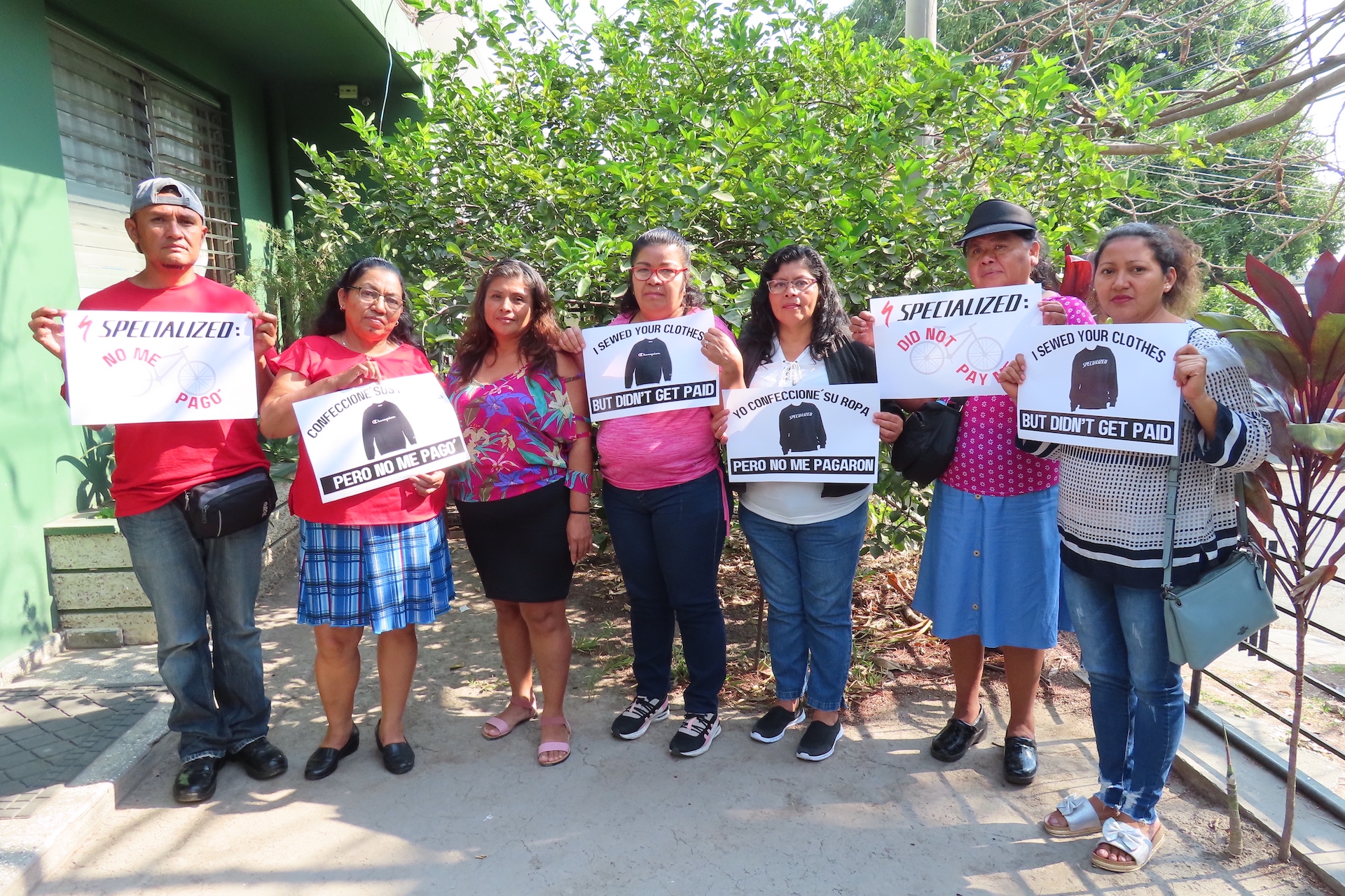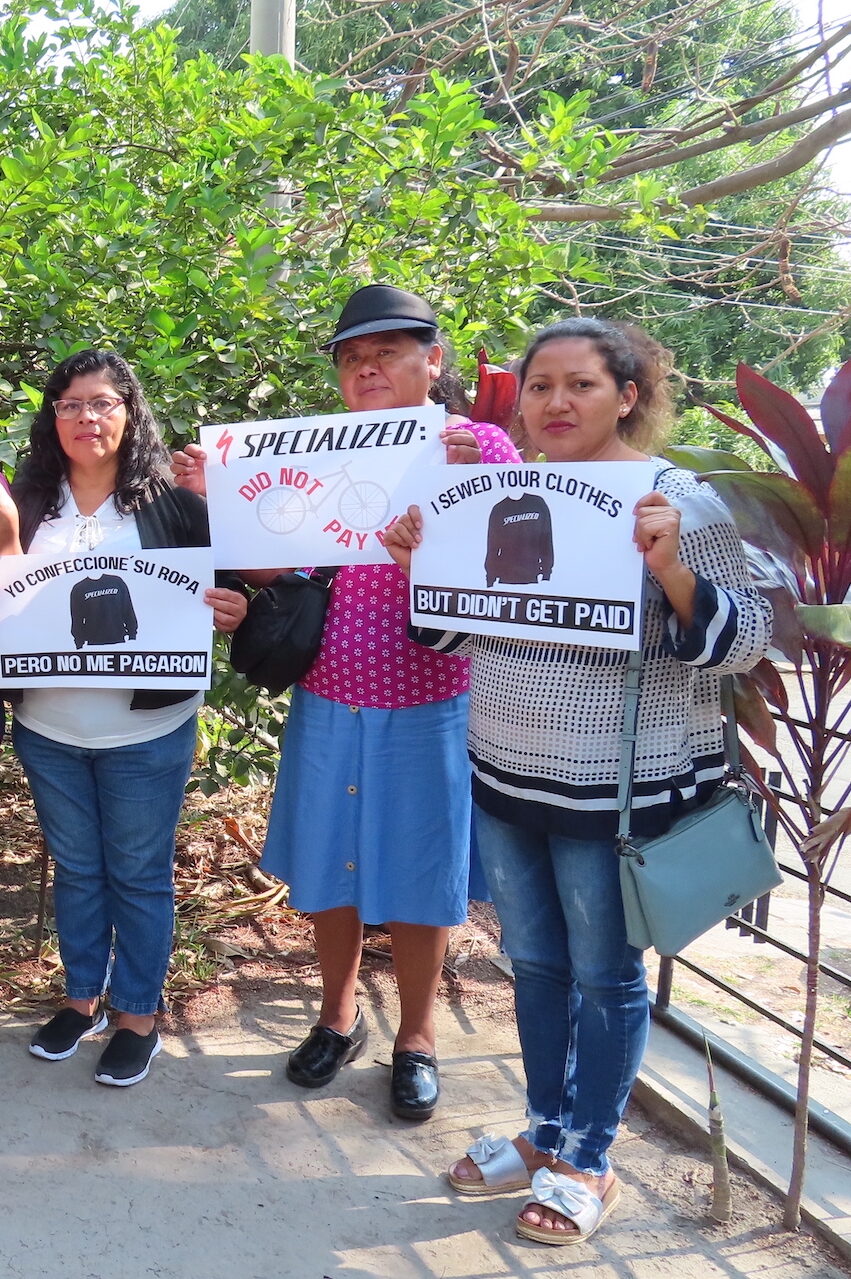Pro bike racing is no stranger to protests. Activists for causes of all stripes routinely use the platform the sport provides to spread messages about climate change, political causes, and a variety of issues. But a protest that happened recently in Belgium at the Tour of Flanders was unusual for two reasons.
First, it happened at the amateur sportive ride on Saturday, not Sunday’s WorldTour men’s and women’s races. And second, the protest was directly about cycling. Among the estimated 16,000 entrants who tackled the greasy Koppenberg and other challenges on the sportive route, roughly a half dozen riders used the event to call attention to allegations that Specialized, one of the largest cycling brands in the world and a top WorldTour equipment sponsor, has failed to live up to its own stated commitments to fair labor after a factory producing apparel for Specialized, among other customers, closed and failed to pay its workers some US$2 million in back wages and annual severance.
An abrupt ending
On the morning of August 30, 2022, Irma Elizabeth Mestizo reported for her shift at APS El Salvador, a garment manufacturer located in a free trade zone near Ilopango International Airport in the capital of San Salvador. Mestizo, in her late 40s, had worked for the company for 14 years, sewing mostly casual apparel for international brands like Hanes’ Champion line of athletic wear, Gildan (the parent company of American Apparel), and Specialized Bicycles. Her salary – the minimum Salvadoran wage of $360 a month for garment workers (the U.S. dollar has been official Salvadoran currency since 2001) – was not large, but it allowed her to cover most of her expenses. “I bought medicine for my mother. I covered my daughters’ studies. I paid for my house,” she said in quotes provided by the nonprofit advocacy group Green America, which along with the Worker Rights Consortium is working to help her get paid.
But a little before noon that day, according to a report from the WRC, security guards from the building’s landlord began abruptly ordering the workers to leave the premises; APS El Salvador, apparently, was behind on rent and being evicted. Shortly after, the workers were told by APS El Salvador that the factory was closing, effective immediately. Mestizo and some 830 other workers were abruptly laid off, and left with wage and severance pay shortages of more than $2,000 per worker on average – more for longtime employees like Mestizo.
The unions representing workers at the factory appealed to the Salvadoran government for help getting what was owed. But there was a problem: APS El Salvador was owned by a larger company – Oneworld Star International – which itself was a subsidiary of a publicly traded Chinese corporation, Shangying Global, that was delisted from the Shanghai stock exchange around the same time as the factory closure.
With no owner to pursue for payment, the government made an agreement with the unions to garnish proceeds from the sale of any of APS El Salvador’s stranded equipment and other assets to pay up to 50% of what was owed. But with El Salvador’s garment industry in a cyclical downturn, no buyer was found. That left only one recourse: go to the brands that sourced apparel from APS El Salvador – many of which, including Specialized, have fair labor policies that specifically reference wages – to pay the workers what they’re owed.
It is increasingly common for brands to step in to pay worker wages when factories fail, and that is considered best practice by the Fair Labor Association (one of the oldest and largest NGOs in the apparel industry, but which was not involved in the APS case). When the WRC and Green America began contacting APS El Salvador’s client brands on behalf of the workers, several responded quickly and positively. Gildan, Kellwood, and Alwants, for instance, agreed to contribute a little over $1.3 million between them to pay the workers.
But that left a gap of around $700,000, and other brands were far less forthcoming. It was only after sustained efforts that Hanes, for example, pitched in what WRC calls a “nominal” amount to the fund (despite being an FLA member). And WRC and Green America say that despite repeated requests to engage Specialized in discussions – sent via various modes to multiple employees in sourcing, sustainability, and executive roles including CEO Scott Maguire, a former Dyson executive who became CEO in March 2022 – the company simply never responded and, ultimately, began blocking their e-mail domains.
“All the other buyers we engaged with except a few small ones all responded to us,” said Liana Foxvog, director of supply chain strategies for the WRC. It’s not common, Foxvog added, for brands to immediately outline what steps they’ll take when factories close and leave workers unpaid, “but they at least acknowledge the situation and discuss possible solutions.”
Specialized, and my sources at WRC and Green America, made clear that the company has no legal liability here; the nonprofits are attempting to appeal to Specialized’s own stated ethical manufacturing values. “When we discover issues, we work with the supplier to develop a corrective action plan with specific tasks and timelines,” Specialized’s web page on responsible manufacturing reads in part.
In an interview in late March, Specialized spokesperson Ben Edwards said Specialized represented a small amount of the factory’s business – roughly 5% – and claimed that the brand was engaging with its local partner to find out what had happened. But the company’s investigation seemed to have only just begun, and he had few details to share about that timeline or what they’d learned so far.
Edwards subsequently told me in early April that, “Bottom line, we all have the same goal, make sure the workers get paid what they are owed for any work they did on Specialized apparel that they did not receive income for.” On April 9, Edwards told me, the company opted to move forward with a payment of $44,238.29 to the workers, an amount it said was arrived at by calculating the total estimated wages from its last three months of work at the factory.
But it’s not clear how that figure or the three-month wage window was selected, and the amount represents less than half of what Specialized would pay if calculating by its share of the factory’s capacity. Finally, Edwards didn’t have a substantive response to why the brand ignored the nonprofits’ repeated requests over months to engage: interactions that would have provided Specialized exactly the answers Edwards said it sought, as well as a direct line to the workers themselves and a speedier resolution.
Both WRC and Green America say the planned payment falls well short of the brand’s responsibilities, and they still have not been able to get in touch with Specialized. “Specialized has done nothing for 20 months,” said Foxvog in an e-mail after learning (from this reporter) of Specialized’s plans. “They refused to even speak with the workers. And now Specialized proposes to pay pennies on the dollar for compensation the workers legally earned. If Specialized thinks that is a credible approach to human rights violations in their supply chain, they’re deeply confused.”
Global industry, global problems
Most apparel companies – and the cycling industry is no exception – do not actually make their own products. In fact, from hardgoods to apparel, the vast majority of cycling brands like Specialized own none of their own factories. Specialized, for instance, focuses on product design, distribution, marketing, and retail, relying on a complex web of suppliers to manufacture the actual goods sold under the Specialized brand.
Apparel may be the best example of the complexities of this industrial globalization. According to its own disclosures, apparel brand Rapha worked with 31 Tier 1 – or finished goods – suppliers in 17 countries in 2022. Some of those suppliers have multiple factories or subcontractors, for a total of 66 actual production facilities. That doesn’t include the 97 Tier 2 suppliers (179 facilities, 18 countries) which produce all the components like zippers and fabrics used in those garments, or the Tier 3 suppliers who grow or create raw materials like yarn or dyes. According to Rapha, its Tier 1 supply chain alone comprises some 36,513 workers (that’s the total employee base; in large factories especially only a portion of workers may produce a particular brand’s orders).
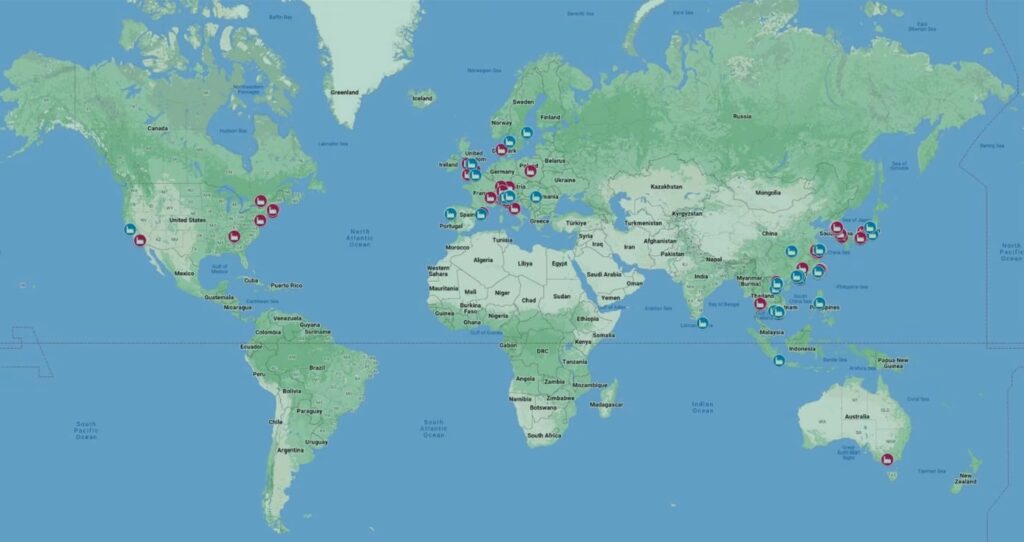
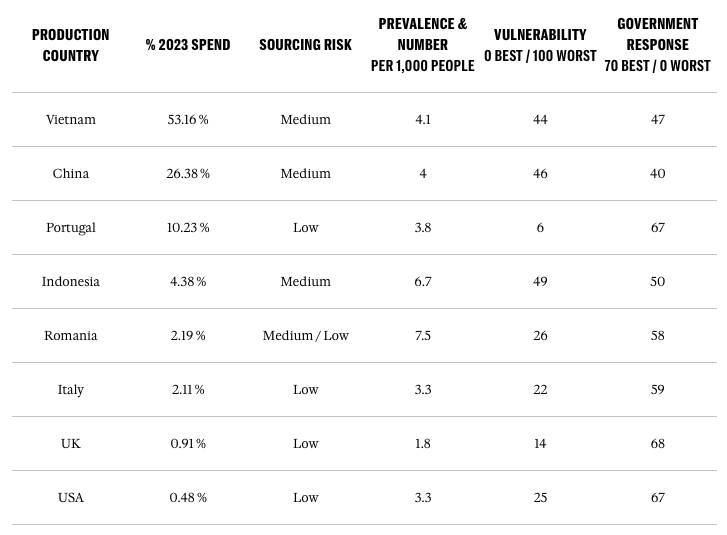
Apparel – particularly Tier 1 finished-goods manufacture – is El Salvador’s single largest industry by export value; according to the World Bank, El Salvador exports roughly US$1 billion a year in apparel to the United States alone – its largest trade partner.
The Salvadoran garment industry has relatively fewer of the problems of other countries that are major players in the industry like China or Vietnam, according to a fair-labor NGO I spoke with that was not involved in the APS El Salvador investigation. El Salvador lacks a large migrant-worker population, so labor trafficking is less common, although still present. It has at least some free-association rights for workers to organize, as well as minimum wages, which vary by industry.
But those wages are not considered to be a living wage – which covers basic needs with a small cushion – and there is no unemployment insurance program. With the economic headwinds of rising interest rates and decreased investment capital, many apparel factories and their parent companies are feeling a chill. Some of them, like Shangying Global, go under entirely. And when they do, they often leave workers holding an empty bag.
In addition to massive recent struggles with gang violence, according to the U.S. State Department El Salvador suffers broadly from human rights violations and a judicial system that is slow and inconsistent to enforce workers’ rights, infrequently applies penalties for violators, with enforcement that may depend on the political affiliations of labor unions.
Apparel industry experts I spoke with agreed, saying that one of the principal issues with the Salvadoran legal and social safety net is that wage violations are common and enforcement is often lacking. It’s rare for the government to garnish an employer’s assets to pay laid-off workers, for example. Another example is severance pay.
Salvadoran law requires employers to pay laid-off workers one month’s wages for every year they’ve been employed. That’s particularly important for older, long-term employees. For those workers in particular, finding a new job can be hard as employers want younger workers. But there are few rules regulating how severance is paid or oversight when it’s not, and enforcement is almost non-existent. Some employers pay severance in advance, which has positives and negatives. But that’s still better than not getting paid at all when a factory suddenly closes.
A factory closure, for the above reasons, is a desperate situation for the workers. But it’s also not ideal for customers, who can be left without deliveries for partly or fully paid orders. Over the past roughly three decades, largely in response to pressure over workers’ rights violations but also to professionalize the supply chain, the apparel industry has gradually built a loose structure of independent fair-trade oversight and compliance, run mostly by NGOs.
The system is an ad hoc, sometimes-chaotic mishmash of overlapping and competing organizations, but two of the largest standard bearers are the Fair Labor Association and the United Nations’ International Labor Organization, or ILO. Both have detailed standards and guidance documents, the goal of which is twofold: to ensure ethical, fair-trade manufacturing practices; and a stable, sustainable supply chain. Whether member companies or not, many brands like Specialized (which is not an FLA member) namecheck the FLA’s guidance as informing their supply chain codes of conduct.
The central tool companies rely on is a supplier audit. Some large apparel brands do their own auditing, but it’s more common to rely partly or exclusively on a third party – sometimes an NGO, sometimes a for-profit partner such as Impactt or Elevate – to conduct an on-site assessment of a factory. Those investigations range in both scope and depth, as well as detail, and require close cooperation by the factory.
A high-quality audit will examine everything from whether working conditions are safe (are there enough exits and are they accessible and unblocked?; are there fire-safety systems in place?) to the factory’s own finances. There should be a forensic examination of payroll books and paystubs to look for signs of wage theft or forced labor. Workers are interviewed – ideally anonymously and off-site, away from managers – to screen for physical, verbal, or sexual abuse, trafficking, or other rights violations.
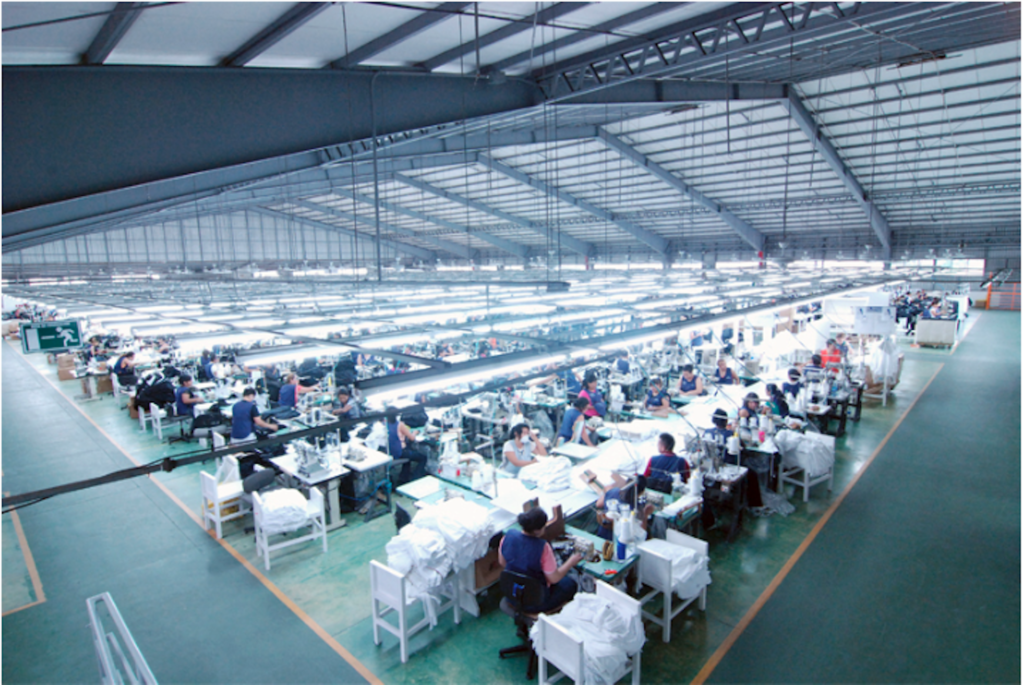
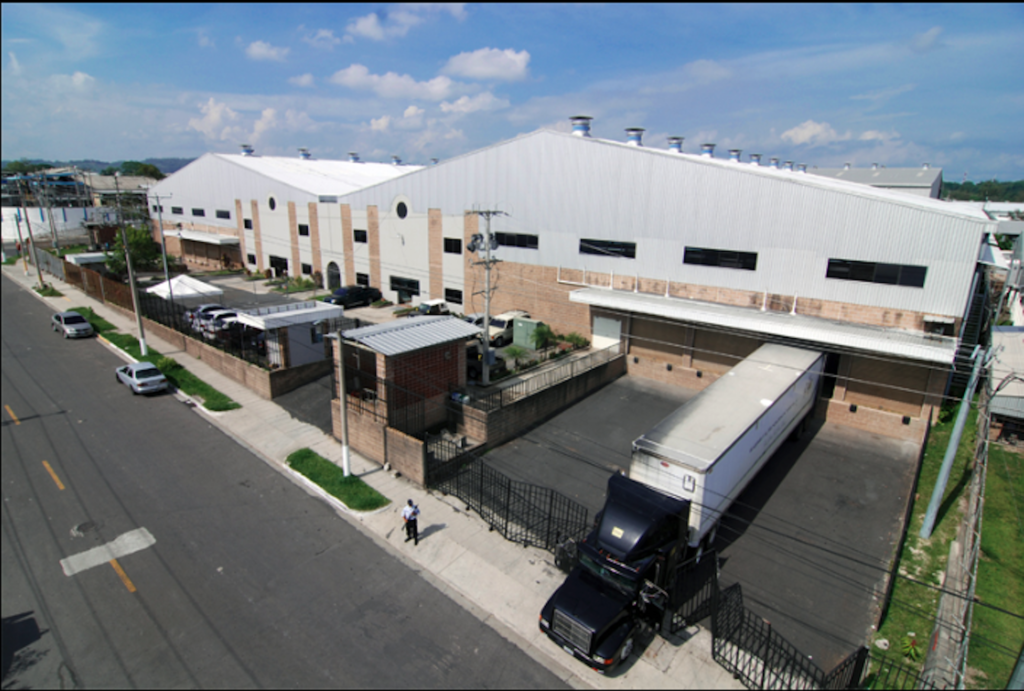
In the best-case scenario, in-depth audits happen annually until a long-term relationship is established, after which they happen every two to three years. Audits can tell an apparel brand not only who to partner with and who not, but when there are concerning signs of change at a trusted supplier. But audits vary widely in their quality and frequency. In the worst cases, they’re a sporadic box-ticking exercise, and because there is no regulatory oversight of the audit industry itself, there is – as one source told me several years ago for another story – a lot of sausage to be made in the fair-labor certification space.
In some cases, apparel brands aren’t involved at all, relying instead on an intermediary both to fulfill the order and for oversight and compliance with fair-labor standards. That is the arrangement Specialized used with APS El Salvador. Edwards told me the brand contracted its work through a supplier agent and communicated its code of conduct through them. In a quote attributed to Jeff Edwards, Specialized’s apparel leader, the company said its process for vetting any new supplier is to “contact the factory and do a pre-audit to ensure they live up to our Supply Chain standards as well as other standards like WRAP and ISO 9001. The APS factory in El Salvador was a WRAP-certified facility” which Specialized later clarified meant an independent audit to WRAP’s Platinum-level standard.
WRAP, or World Responsible Accredited Production, is a Virginia-based NGO that works with local audit partners across the world to certify factories. It’s closely affiliated with the American Apparel and Footwear Association trade group, and the WRC has repeatedly criticized WRAP in the past for lax audit diligence and lack of transparency, including in the case of a 2012 fire at a formerly WRAP-certified factory in Pakistan that killed more than 250 workers. A subsequent NY Times investigation found the factory was also violating minimum-wage laws.
To truly have insight into your supply chain, NGO sources told me, brands can’t rely solely on third-party audits or agents. They need to have direct relationships with the factories themselves, which provides important intelligence: did a key customer abruptly exit its relationship with the factory, leaving it under capacity? Are workers being laid off or are paychecks coming late? The industry-leading FLA, for example, has a 24-page best practices document on how to handle factory layoffs, exits, and closures. One of its key sourcing principles is to directly monitor facilities to make sure factory practices align with both legal requirements and the brand’s own fair labor standards. And the simple math is the more suppliers you have, the more agents and layers between buyer and factory, the harder that is to do.
Despite several requests, Specialized did not make a member of its apparel or sustainability teams available to discuss its oversight procedures. The brand also declined to say how many Tier 1 suppliers Specialized has for apparel, but its product line suggests a complex supply chain. Specialized’s apparel includes multiple options of essentially every piece of riding kit you can buy: its U.S. offerings include more than 30 different gloves and in excess of 25 men’s jersey options for road and trail riding. There are also four casual, hooded sweatshirts.
That product is what APS El Salvador employees say they made, in particular the Legacy Pull-Over, which normally retails for US$90, or exactly one-fourth the monthly wage for an APS El Salvador worker. Specialized says that its orders accounted for around five percent of APS El Salvador’s factory capacity, and that its last work with the factory dates to February 2022, months before its abrupt closure (apparel orders are often seasonal). Numerous workers WRC spoke with for its report identified the Specialized logo and said that they had worked on apparel from the brand, and recently before the closure. Neither side’s claim is possible to independently verify. WRC has incomplete shipping data, but its last record of Specialized goods exiting APS El Salvador was on May 31, 2022.
Voluntary accountability
The good thing about the fair-labor compliance system is it’s entirely voluntary; that’s also the bad thing. It only works as well as a company’s commitment to it. Outdoor brand Patagonia is one of the industry leaders in the space. Using a combination of staff and partners, it does annual audits of all Tier 1 suppliers and subcontractors, publishes a twice-yearly Tier 1 factory list, and actively participates in fair-labor programs through the FLA (it’s a founding member), and ILO’s Better Work program.
Still, even conscientious companies can struggle to ensure compliance; in 2015, Patagonia disclosed that one of its audits had found signs of forced labor in its supply chain, and subsequently revamped its migrant worker policies to address the issue and repaid workers. (Remediation often involves working with the supplier to fix problems; quitting a factory is a last resort, as it may actually worsen the situation.)
No one I spoke with faulted Specialized or any of the other APS El Salvador customers brands for the factory’s closure, or its failure to pay workers’ wages and severance. But they were mystified by Specialized’s near-complete lack of response when alerted to the problem. WRC and Green America started with e-mails, faxes, and hardcopy letters sent via certified mail, all sent to multiple employees and executives at Specialized. The messages, which Escape Collective has seen, are not a demand for money, but simply an explanation of the situation and a request to engage to ensure the workers got paid. Attempts to contact the company began in late November, 2022, with a subsequent attempt in January 2023.
In August 2023, on the anniversary of the factory’s closure, representatives of Green America visited Specialized’s Morgan Hill, California headquarters to deliver consumer petitions about the unpaid wages and met in person with an employee who works directly with Maguire in the executive suite. The employee, whose name I am withholding because they do not have a public-facing role, professed to be surprised by the news of unpaid workers, offered her contact info, and promised to pass the information on.
“We were quite encouraged,” recalled Jean Tong, Green America’s labor justice campaigns director. “Generally speaking, we either get a pretty hostile response when we try to speak with someone in person, or we establish a line of communication. And we thought we did the latter.” But weeks went by with no contact. Further final attempts to contact Specialized, in September and December 2023, were similarly met with silence and bounced e-mails. Edwards said Specialized blocked the domains after receiving “thousands” of e-mails that it suspected were spam, but were in fact user-generated petitions, or form letters, sent as part of a publicity campaign organized by Green America and the Clean Clothes Campaign.
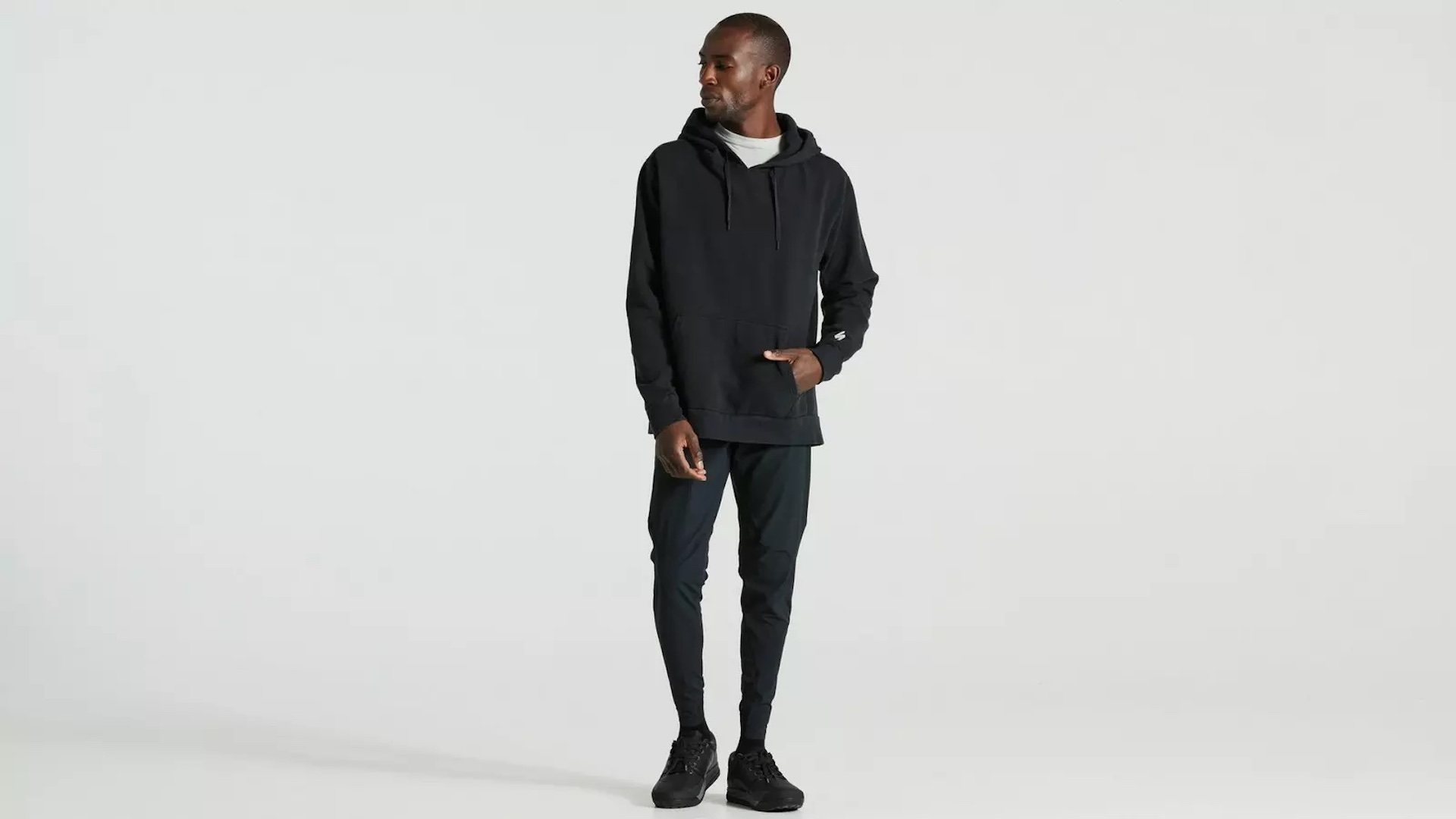
“Listen, Specialized has a foundation, a nonprofit; they clearly want to do good things for the world,” said Tong of her puzzlement at the company’s actions. Further, Specialized’s own social responsibility language says that its code of conduct is “informed by” guidance from the ILO, the World Federation for Sporting Goods Industries’ Responsible Sport Initiative (of which Specialized is a founding member), and the Fair Labor Association (again, Specialized is not a member). FLA best practice expressly recommends that factory customers directly create an escrow account for severance in the event a manufacturing partner appears to be in enough financial trouble that it might not pay workers, and to collaborate with other companies sourcing from the factory “to determine if they can provide financial assistance to the workers.”
Specialized’s public statements on responsible manufacturing are simple and spartan. The company identifies “supplier continuous improvement” and touts its social responsibility team, while also highlighting its founding membership of the WFSGI’s Responsible Sport Initiative and that it uses a supplier database from the Fair Factories Clearinghouse. “For manufacturing partners who are of strategic importance, we conduct a comprehensive audit that covers occupational health and safety, labor law compliance, as well as compliance with environmental regulations,” it says. But that’s as far as it goes, and it was only through repeated questioning that I was able to learn even basic information about Specialized’s compliance structure.
In the case of APS El Salvador, according to comments from Specialized the company appears to have relied entirely on its agent and third-party auditing in direct contravention of FLA best practice. In fact, Specialized seems to have become aware of the non-payment of employees only recently, even after sustained, year-long attempts by nonprofits to engage them on an event that is now 20 months old.
An industry-wide blind spot
Specialized is far from alone in the bike industry in its practices. A survey of a number of top cycling apparel brands’ web sites shows very few have more than simple language about sustainability, and much of that is focused on environmental values and practices. Several recent laws, including the UK Modern Slavery Act and the California Transparency in Supply Chains Act, mandate that companies past a certain size that do business in those places publicly state what they do to combat labor trafficking and other human rights violations in supply chains, even if that’s nothing at all.
Most brands’ statements to that specific legal requirement – or broader sustainability initiatives, where available – are marked by bland, aspirational language and vanishingly light on specifics. In many ways, Rapha’s annual impact reports and relatively more-detailed discussion of its manufacturing values and practices are an exception, in particular in cycling. Aside from Rapha, Gore Wear – an FLA member – also publishes a Tier 1 supplier list, while Rapha and Pearl Izumi are members of Cascale, formerly the Sustainable Apparel Coalition, another NGO.
Our sport has for years lagged behind the outdoor industry in its environmental initiatives, perhaps content to coast on the green bona fides of the act of cycling itself. But even as environmental focus improves visibly with each passing year for many cycling apparel brands, the social responsibility side of the equation goes unbalanced. These are not small challenges; no part of the apparel industry – and no single company – has managed to convincingly declare victory in ensuring that supply chains are uniformly ethical and safe workplaces that offer fair pay and other basic rights.
But they are worth trying to solve. Mestizo, the former APS El Salvador worker, says she’s been just getting by lately “with little jobs. For example, I help out at a pupuseria. With my sewing machine at home, I do some mending. That’s how I’m surviving.” But, she adds, it’s been hard to afford enough food, her mother is ill, and she is in danger of defaulting on her house.
Getting the wages and severance owed to her won’t solve all those problems, or get her a new job. As WRC’s Foxvog says, only companies’ own “binding commitments to labor standards in supply chains, to ensure corrective action when violations are documented and to be working toward living wages and freedom of association” will begin to fix systemic issues. But getting Mestizo her full back pay is a start. It’s something. And it’s what’s owed to her and 830 others. Even now, says Green America’s Tong, the focus remains on making the workers whole. “We’re still open to a real conversation with Specialized,” she said. “Our job is not to condemn; it’s to get the workers paid.”
Cycling apparel is not, whatever we might think of the industry’s annual colorways and changing styles, fast fashion in the same sense as mainstream brands like Shein. Our apparel is, almost all of it, highly technical, fastidiously engineered, and built to last, which are all admirable attributes. We count on this gear to keep us comfortable to perform on long, hot days in the saddle, or dry and warm when exposed to the elements.
All comes at a literal cost we are willing to pay, in the form of $250 bib shorts and $300 jackets. The industry sells us on these expensive items with a story to which we willingly listen: that they are an investment in our comfort and enjoyment of this sport that we love. If that is true, then maybe we can expect the investment in those shorts and jackets – and, yes, a $90 cotton hoodie – to have something else engineered into their threads: comfort and dignity for those who made them.
What did you think of this story?

